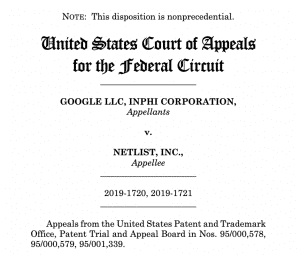Google has lost an appeal to a patent infringement lawsuit that has been ongoing for several years now. The case, Google, LLC vs. Netlist, Inc., is a case where Google argued that a patent owned by Netlist, Inc. was invalid. Google claimed that part of the patent “involving the specific use of rank-selecting signals for rank multiplication” was invalid.
In their press release, Netlist, Inc. said, “In response to Netlist’s 2009 complaint, Google first filed its petition for reexamination of the ‘912 patent in 2010 and was later joined in its effort by Inphi and Smart Modular. On January 31, 2019 PTAB denied Google’s request for a rehearing of the PTAB’s previous decision upholding the validity of the ‘912 patent claims. The PTAB’s extensive rehearing decision adopted Netlist’s positions on the claims and rejected Google’s invalidity arguments involving the specific use of rank-selecting signals for rank multiplication.
Netlist believes that the teachings of the ‘912 patent can be found in various DDR3 and DDR4 server DIMMs (Dual Inline Memory Module) as well as future products that will be produced under the DDR5 server DIMM standards currently being established by the industry.”
NetList, Inc. provides high-performance SSDs and modular memory subsystems to enterprise customers in diverse industries. The Company’s NVMe™ SSD portfolio provides industry-leading performance offered in multiple capacities and form factors. HybriDIMM™, Netlist’s next-generation storage class memory product, addresses the growing need for real-time analytics in Big Data applications, in-memory databases, high-performance computing and advanced data storage solutions. Netlist also manufactures a line of specialty and legacy memory products to storage customers, appliance customers, system builders and cloud and datacenter customers. Netlist holds a portfolio of patents in the areas of server memory, hybrid memory, storage class memory, rank multiplication and load reduction.
“For ten years Netlist has steadfastly opposed Google’s misguided campaign to invalidate the ‘912 patent,” said Netlist’s CEO, C.K. Hong.
In the patent in question, patent 7,619,912, the patent mentions ranks: “The memory module comprises a plurality of memory devices arranged in a first number of ranks. The method further comprises inputting a first set of control signals to the memory module. The first set of control signals corresponds to a second number of ranks smaller than the first number of ranks. The method further comprises generating a second set of control signals in response to the first set of control signals. The second set of control signals corresponds to the first number of ranks.” What I do not know, however, is whether or not the “rank” mentioned here is applicable to any of Google’s search engine algorithms. You can read the full patent, linked below.
Yesterday’s decision can be found here: http://www.cafc.uscourts.gov/sites/default/files/opinions-orders/19-1720.RULE_36_JUDGMENT.6-15-2020_1603464.pdf
Ironically, you can read the full patent here: https://patents.google.com/patent/US7619912B2/
